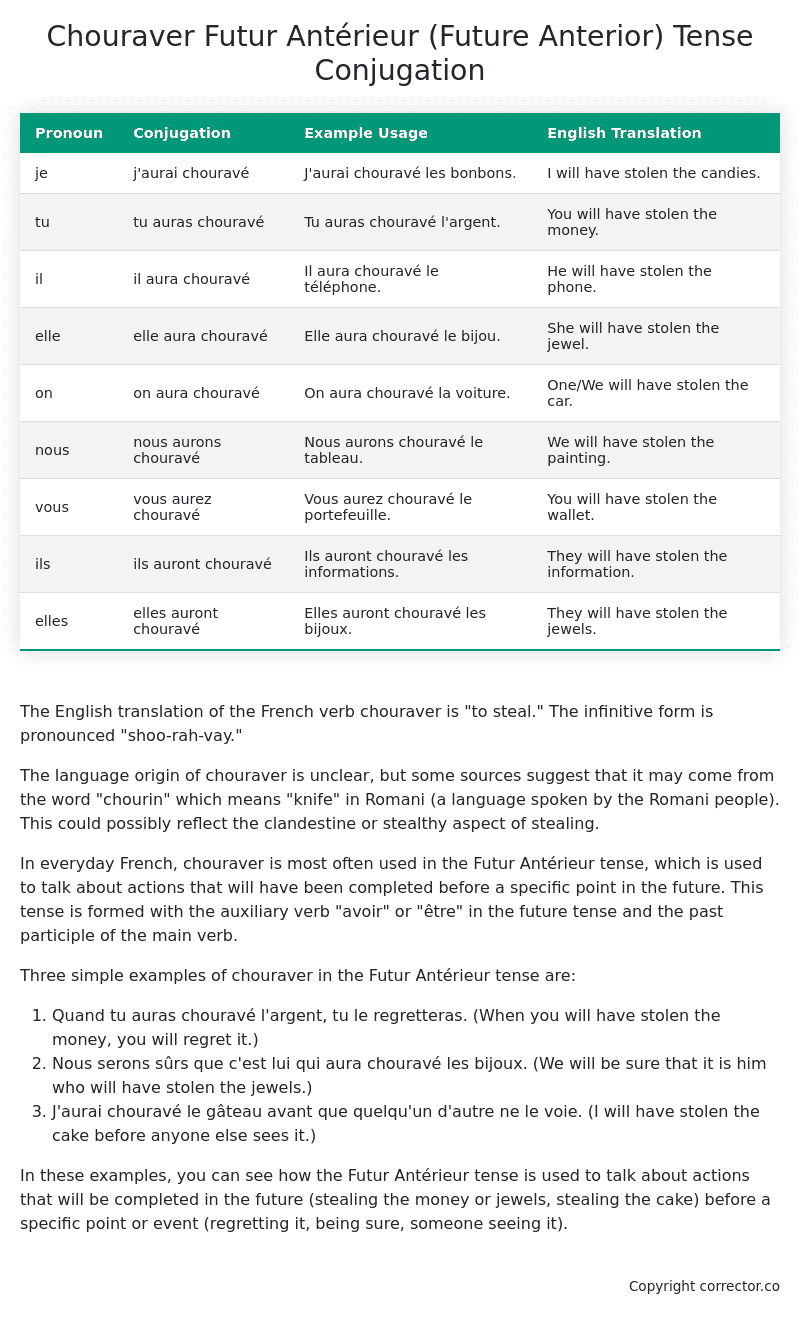Futur Antérieur (Future Anterior) Tense Conjugation of the French Verb chouraver
Introduction to the verb chouraver
The English translation of the French verb chouraver is “to steal.” The infinitive form is pronounced “shoo-rah-vay.”
The language origin of chouraver is unclear, but some sources suggest that it may come from the word “chourin” which means “knife” in Romani (a language spoken by the Romani people). This could possibly reflect the clandestine or stealthy aspect of stealing.
In everyday French, chouraver is most often used in the Futur Antérieur tense, which is used to talk about actions that will have been completed before a specific point in the future. This tense is formed with the auxiliary verb “avoir” or “être” in the future tense and the past participle of the main verb.
Three simple examples of chouraver in the Futur Antérieur tense are:
- Quand tu auras chouravé l’argent, tu le regretteras. (When you will have stolen the money, you will regret it.)
- Nous serons sûrs que c’est lui qui aura chouravé les bijoux. (We will be sure that it is him who will have stolen the jewels.)
- J’aurai chouravé le gâteau avant que quelqu’un d’autre ne le voie. (I will have stolen the cake before anyone else sees it.)
In these examples, you can see how the Futur Antérieur tense is used to talk about actions that will be completed in the future (stealing the money or jewels, stealing the cake) before a specific point or event (regretting it, being sure, someone seeing it).
Table of the Futur Antérieur (Future Anterior) Tense Conjugation of chouraver
| Pronoun | Conjugation | Example Usage | English Translation |
|---|---|---|---|
| je | j’aurai chouravé | J’aurai chouravé les bonbons. | I will have stolen the candies. |
| tu | tu auras chouravé | Tu auras chouravé l’argent. | You will have stolen the money. |
| il | il aura chouravé | Il aura chouravé le téléphone. | He will have stolen the phone. |
| elle | elle aura chouravé | Elle aura chouravé le bijou. | She will have stolen the jewel. |
| on | on aura chouravé | On aura chouravé la voiture. | One/We will have stolen the car. |
| nous | nous aurons chouravé | Nous aurons chouravé le tableau. | We will have stolen the painting. |
| vous | vous aurez chouravé | Vous aurez chouravé le portefeuille. | You will have stolen the wallet. |
| ils | ils auront chouravé | Ils auront chouravé les informations. | They will have stolen the information. |
| elles | elles auront chouravé | Elles auront chouravé les bijoux. | They will have stolen the jewels. |
Other Conjugations for Chouraver.
Le Present (Present Tense) Conjugation of the French Verb chouraver
Imparfait (Imperfect) Tense Conjugation of the French Verb chouraver
Passé Simple (Simple Past) Tense Conjugation of the French Verb chouraver
Passé Composé (Present Perfect) Tense Conjugation of the French Verb chouraver
Futur Simple (Simple Future) Tense Conjugation of the French Verb chouraver
Futur Proche (Near Future) Tense Conjugation of the French Verb chouraver
Plus-que-parfait (Pluperfect) Tense Conjugation of the French Verb chouraver
Passé Antérieur (Past Anterior) Tense Conjugation of the French Verb chouraver
Futur Antérieur (Future Anterior) Tense Conjugation of the French Verb chouraver (this article)
Subjonctif Présent (Subjunctive Present) Tense Conjugation of the French Verb chouraver
Subjonctif Passé (Subjunctive Past) Tense Conjugation of the French Verb chouraver
Subjonctif Imparfait (Subjunctive Imperfect) Tense Conjugation of the French Verb chouraver
Subjonctif Plus-que-parfait (Subjunctive Pluperfect) Tense Conjugation of the French Verb chouraver
Conditionnel Présent (Conditional Present) Tense Conjugation of the French Verb chouraver
Conditionnel Passé (Conditional Past) Tense Conjugation of the French Verb chouraver
L’impératif Présent (Imperative Present) Tense Conjugation of the French Verb chouraver
L’infinitif Présent (Infinitive Present) Tense Conjugation of the French Verb chouraver
Struggling with French verbs or the language in general? Why not use our free French Grammar Checker – no registration required!
Get a FREE Download Study Sheet of this Conjugation 🔥
Simply right click the image below, click “save image” and get your free reference for the chouraver Futur Antérieur tense conjugation!

Chouraver – About the French Futur Antérieur (Future Anterior) Tense
Construction
Common Everyday Usage Patterns
Interactions with Other Tenses
For example
Summary
I hope you enjoyed this article on the verb chouraver. Still in a learning mood? Check out another TOTALLY random French verb conjugation!


